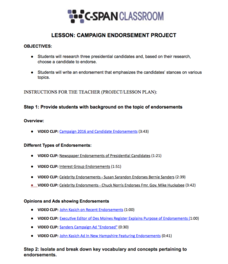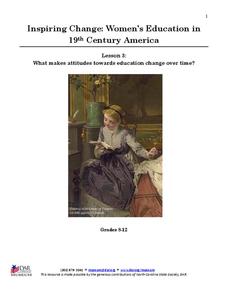C-SPAN
Campaign Endorsement Project
So many politicians, so many endorsements! Learn to differentiate between facts as well as the process of endorsements with an informative resource. Class members watch current endorsement videos, research candidates from three different...
Alabama Department of Archives and History
Inside the Wire: Internment of Prisoners of War in Alabama during World War II
Create an open environment of discussion and collaboration with several exercises in a thought-provoking resource. Pupils conduct a gallery walk and lead a discussion before filling out a question sheet and chart during the learning...
PBS
Women's History: Glass Windows; Glass Ceilings
Discover stories about women's history in beautiful stained glass windows. The second in a three-part series teaches scholars about a famous artistic style of stained glass windows and the influential women that used art to impact...
New York State Education Department
TASC Transition Curriculum: Workshop 10
How have educational standards evolved? Educators of adults examine expectations in the 10th workshop out of 15 to better determine how standards have grown. Participants respond to a variety of sample questions to determine how they...
National Park Service
A Natural Resource Called Peace
Get your pupils outside and teach them about peace at the same time! Scholars create a list describing peace, hike outside, add to that list, and later create poems. The exercises support differentiation for your individual classes as...
National Park Service
Same Colors, Different Flavors
Who says getting to know your neighbors has to be difficult? The first resource in a three-part series creates an engaging project that teaches your scholars about Canadian culture. A question-and-answer format takes place via e-mail and...
Carolina K-12
Making First Vote Your Vote: Designing a Schoolwide Election
Encourage pupils to design an election plan for the entire school. They participate in a Board of Elections, create polling rules, discuss election controversies, write questions about the issues, run the election through an online...
University of California
The Civil War: Final Assessment
Pupils discover the true nature and purpose of the Civil War in the eighth and final installment of an informative series. Using primary and secondary documents, history buffs merge social study knowledge with English skills to create a...
University of California
The Civil War: Effects of the Civil War
Imagine being on the front line of the Civil War —from the front porch of your own house. Scholars use visual evidence from primary and secondary sources to analyze the impact of the Civil War on all Americans. They examine the research...
University of California
The Civil War: Lincoln’s Speeches
Abraham Lincoln is responsible for uniting the states during the most tumultuous periods in American history, and for his elegant oratory that kept the Union believing in its cause. Young histoians analyze various speeches by America's...
PBS
Using Primary Sources: Nazi Spy Ring Busted
Spy games are not just for professionals anymore! Scholars use short video clips, primary documents, and photographs to investigate Nazi spies in America during World War II. The young detectives analyze the paranoia warfare can create...
PBS
Myth of the West: Kit Carson to the Rescue
There's nothing like the Wild Wild West! Scholars investigate the American Frontier through the eyes of Kit Carson. To complete the first installment of a three-part series, they use presentations, a short video, and primary and...
National Endowment for the Humanities
Women's Lives Before the Civil War
Women's lifestyles before the Civil War made a huge impact as a point of causation. Give middle schoolers the opportunity to view firsthand the lives of women before the Civil War. They analyze primary source documents, view photographs,...
National Endowment for the Humanities
Life Before the Civil War
American life before the Civil War was very different from American life today. To show this difference in a full spectrum, learners compare two communities that illustrate the differences between Northern and Southern life. Throughout...
National Endowment for the Humanities
A Debate Against Slavery
Slavery is a serious topic that can be challenging for middle schoolers to study. Young scholars can see firsthand through primary sources what occurred during that time period in the United States. The third of five lessons provides...
National Endowment for the Humanities
George Washington: The Precedent President
Everyone knows that George Washington was the first president, but do your scholars know why that was so important? The lesson plan, the third in a sequence of three, allows learners to understand how George Washington set a precedent...
National Society Daughters of the American Revolution
Lesson 3: What Makes Attitudes Towards Education Change over Time?
The struggle for women's rights is not unique to this generation, or even to the 20th century. Class members explore the conflicting opinions of Alexander Graham Bell and his wife, Mabel Hubbard Bell, regarding women's pursuits of higher...
Daughters of the American Revolution
Lesson 2: How Do We Determine the Value of Education?
Have women always had the same educational opportunities as their male counterparts? Young historians read an 1819 essay by Emma Willard on the state of female education in the 19th century before discussing their views regarding women's...
Daughters of the American Revolution
Lesson 1: How Do Society’s Expectations Influence Education?
The history of women's education can be traced back to the delicate stitching of student samplers from the 19th century. Modern-day pupils examine and analyze four primary sources, three of which are images of embroidered samplers, which...
National Endowment for the Humanities
“Read All About It”: Primary Source Reading in “Chronicling America”
Can investigative journalism become too sensationalistic and accusatory, or is it vital for the survival of a democracy? Middle schoolers analyze primary source documents from early 20th-century newspapers as well as Theodore Roosevelt's...
National Endowment for the Humanities
Upton Sinclair, Theodore Roosevelt, and Harvey W. Wiley
Though Upton Sinclair's novel The Jungle shocked the American public into a thorough examination of the meat-packing industry, the author was disappointed that his book's main argument—the exploitation of American immigrants—was not part...
PBS
Before We Travel, We Research
Context is key when it comes to historical research. Prior to field research, class members learn as much as they can about the site they are going to visit. Groups investigate and prepare presentations about the history of the site, the...
PBS
The Sixties: Notes from the Ho Chi Minh Trail
Young historians research the rationales for fighting the Vietnam War, and the controversies surrounding it. They watch film clips, examine photographs, and read Lyndon B. Johnson's message to Congress to gather information for a...
American Battle Monuments Commission
The Sicilian Campaign
The summer of 1943 saw Italy transition from a fascist state in an Allied campaign that eventually became a liberation. Explore the ways Canada, Great Britain, the United States, and the Northwest African Air Forces collaborated to put a...

























